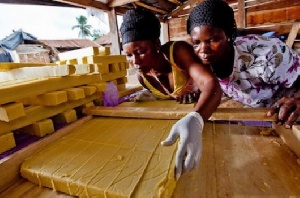Although the Ghana Living Standards Survey (6) estimates that 88% of all employment is to be found in the informal economy, the national minimum wage of GHC8.00 per day or GHC240 per month is beyond the reach of many in the sector, a survey report has shown.
Some 16.4% of employees in the sector earn below GH?30 a month, while 15.2% earn between GHC31 and GH?50 a month.
Another 21.3% earn between GH?51 and GH?100 a month while 14% earn between GHC101 and GHC150 a month.
“Cumulatively, about 75.6% earn below the poverty wage of US$2.00 a day. The average monthly income for both employers and employees is GHC163.00 which works out to GHC6.01 or US$1.83 day,” the report titled ‘Understanding the Urban Informal Economy in Ghana’ indicates.
Whilst most employees (40.4%) in the sector, the survey found, do not have an employment contract, 37.2 percent have only a “verbal contract,” limiting their ability to negotiate a living wage.
“It is not surprising, therefore, that employment relationships are also not necessarily formalized into contracts. Yet, the absence of employment contract weakens the principle of social contract among citizens,” the report says.
“Workers in the informal economy are short-changed in terms of their labour rights, such as the process of engagement and disengagement, retrenchment fees and contribution toward pension scheme.”
The World Bank, the United Nations and the International Labour Organisation all define poverty as living below US$2.00 a day, an amount below which most persons are unable to afford basic needs.
“This means that three-quarters of the urban informal economy employees surveyed are poor,” said the report written by Eben Tawiah Anuwa-Amarh, a commissioner at the National Development Planning Commission, whose research interests lie in the areas of informal economy, spatial development and inclusive growth.
Some 57.6 percent of employees surveyed from the 5000 respondents disagree or strongly disagree that their incomes are enough to secure them a livelihood. Conversely, 21.9 percent agree or strongly agree that their incomes secured them a livelihood, while 20.5 percent were not sure.
The contribution of the informal sector to GDP in Ghana is said to be about 42.3%, and the potential for poverty reduction could be realised through formalising the informal economy, Eben Tawiah said.
The researcher argues that reducing informality in the economy is imperative because it affects GDP growth.
“Countries with high informal economies such as Zimbabwe, with high informal economy contribution (e.g. 61.8%) to GDP, are poor. Conversely, countries such as Switzerland with small informal economy contributions (e.g. 8.5%) to GDP are rich,” the report says.
“There is also a direct relationship between size of the formal economy and GDP. Countries with large formal economies also have high levels of GDP and are rich.”
According to Eben Tawiah: “The potential for poverty reduction can be realised through formalising the informal economy”.
Doing so, he says, will help provide high quality, better-paying, more sustainable employment, while broadening the tax base, reducing the cash-based economy and increasing the welfare of marginalised groups by confirming their rights to participate in market opportunities.
Most of the respondents in the employee category (38.3%) have Senior High School education, while 31.7% have Basic-level education.
The Ghana Living Standards Survey (6) indicates that the sector is predominantly made up of small to medium-scale businesses, consisting of producers, wholesale and retail traders, and service providers comprising contributing family workers, casual wage workers, home-based workers and street vendors, among others.
Business News of Friday, 12 February 2016
Source: B&FT Online

















